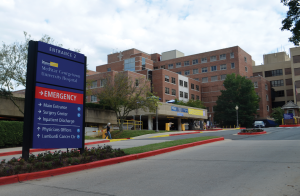
The Georgetown University Medical Center has launched two trials to test the effectiveness of a cancer drug in treating Alzheimer’s disease and Parkinson’s disease.
Georgetown University Medical Center has begun two trials to test a cancer drug’s ability to modify the progression of Parkinson’s disease and Alzheimer’s disease, potentially creating the first drug to successfully combat these two diseases.
Nilotinib is currently approved by the U.S. Food and Drug Administration as a drug treatment for leukemia. In 2015, GUMC researchers found that among 12 patients given nilotinib in small doses, the drug reduced the toxic proteins that build up in the brain with the development of Parkinson’s or Alzheimer’s, without killing the brain cells.
These trials, which started Feb. 27, mark the second phase of trials launched in 2015.
The GUMC Parkinson’s trial will last one year. The outcomes will be evaluated after six and 12 months. Afterwards, patients will participate in a one-year extended trial to observe nilotinib’s long-term effects. The GUMC Alzheimer’s trial will last one year as well and include brain imaging and spinal fluid collections.
Novartis, the company that manufactures nilotinib, is donating the drug and the matching placebo pills for all the participants in the Parkinson’s study. For a 28-pill prescription for the higher doses used for leukemia, the cost would normally be between about $9,000 to $10,000.
Potential side effects of nilotinib include an elevated risk of heart rhythm disturbances. While the trials are using a lower dose than typically prescribed to cancer patients, the participants will be monitored every two to four weeks, and patients with heart diseases are barred from participating.
According to the Centers for Disease Control and Prevention, Parkinson’s and Alzheimer’s are the two most common neurodegenerative diseases, and both arise from damage in brain cells.
Parkinson’s involves physical effects on movement such as tremors, stiffness, loss of balance and slurred speech. Alzheimer’s is characterized by memory problems, disorientation, mood swings and language difficulties.
Currently, there are no known cures for the diseases. Though medications able to treat the symptoms are available, none halt their progression.
Last year, the FDA approved this stage of testing after it evaluated the studies GUMC ran in 2015. These studies are based on years of research conducted by Charbel Moussa, the scientific and clinical research director for Georgetown’s Translational Neurotherapeutics Program.
Moussa performed the initial research on the effect of nilotinib on neurodegenerative diseases in animal models to ensure that the drug was worthwhile and safe to test on human patients.
Fernando Pagan, the medical director of the GUMC Translational Neurotherapeutics Program, is the principal investigator on the Parkinson’s study. Pagan had teamed up with Moussa for the 2015 trials.
He said the trials were designed to measure the effects the proposed treatment will have on the patients.
“This study isn’t for treating symptoms, but rather aims to modify disease progression,” Pagan wrote in an email to The Hoya. “If the drug is safe and shows some benefit, the drug would then need to be studied in a much larger population and at several different institutions. It’s important to note that while I’m optimistic and certainly hopeful, many drugs that do well in early phases of study fail in larger trials.”
GUMC Professor of Neurology and Director of the Memory Disorders Program at Georgetown R. Scott Turner is serving as the principal investigator on the Alzheimer’s study.
Turner said the studies mark a significant point in the history of Alzheimer’s and Parkinson’s research.
“If successful, these trials would have a tremendous impact. Current treatments for AD and PD are symptomatic only — not disease-modifying. This may be a first,” Turner wrote in an email to The Hoya.
Jonathan Lessin, a retired anesthesiologist and one of Pagan’s patients, is currently in the screening phase to participate in the Parkinson’s study. He was diagnosed 14 years ago, at age 38. He will find out if he was approved for the study in the next few weeks, and he said he is hopeful about the possibility that the trial has an impact on patients suffering from these diseases.
“I’m cautiously optimistic,” Lessin said. “He’s had some pretty impressive results in mice that he’s cured of Parkinson’s. He’s got people to walk again and talk again — they were in stage four or five Parkinson’s. I’m always cautiously optimistic. I’ve heard so many things that were promising in the past.”
One way in which this phase’s trials differ from the one performed in 2015 is the inclusion of a placebo group, designed to test how much of the changes experienced by patients can be attributed to psychological factors and not the drug. Neither the patients nor the researchers will know who is in the experimental group and who is in the placebo group until the end of the trials.
According to Turner, if these trials are successful, then phase-three studies could begin. These would involve many more participants receiving treatment at study sites all over the country. This would be the next step toward FDA approval to prescribe nilotinib for neurodegenerative diseases, not just cancer.
Lessin, whose medical background helped him critically read and interpret the results of the 2015 phase-one study, found the trial’s potential to find cures for these diseases impressive.
“It’s the most promising research I’ve heard of in a long time about Parkinson’s,” Lessin said.




















